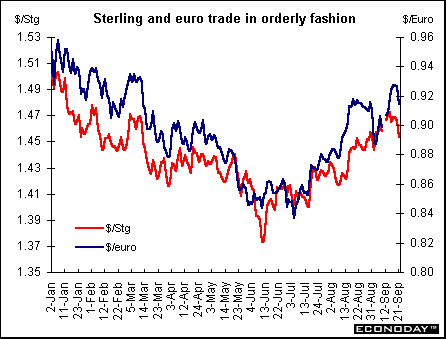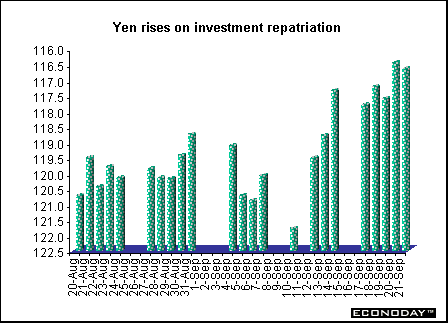
Currencies
The dollar not surprisingly lost ground against most currencies. But the decline was orderly. Traditionally the dollar is a safe haven but now the core of that premise has been shaken. Market uncertainty over the depth and duration of the U.S. slowdown and its global impact appears to explain the euro's recent recovery. Even before the terrorist attacks in August, the euro had extended its gains against the dollar supported mainly by fading prospects for a swift rebound in U.S. economic activity. Mixed U.S. data in early September had reversed some of the euro's gains until the attack hit. Uncertainty immediately appeared in the foreign exchange markets and the dollar fell against all major currencies. But by the following day the magnitude of the drop was rather limited.

The Swiss franc surged higher as tension built in expectation of U.S. military action. The franc soared to a 20-month high against the U.S. dollar and an all time peak against the euro. Escaping risk is the main interest of traders at the moment and this has been reflected in the rise of the Swiss franc as well as the fall in emerging market currencies. Most analysts have argued that the dollar is vulnerable to mounting risk aversion. Funding the U.S.'s current account deficit may become increasingly difficult at a time when international investors are reluctant to increase their overseas exposure. However, in the medium and long term the United States still has tools and flexibility to overcome any economic adversity.
Some analysts think that the dangers to the dollar may be overstated. Although overseas investors own more portfolio assets in the United States than U.S. citizens own abroad, this is mainly due to high foreign ownership of U.S. bonds, the traditional safe haven for the world.
Japan intervened several times in the foreign exchange markets to lower the yen. But the actions proved only a short term solution as the Group of Seven did not launch a concerted effort to sell the currency. Japan had no option but to act alone as it needs a weaker yen to revive its economy. A strong yen hurts already struggling exporters by cutting into repatriated earnings. Japan probably hopes to entice other central banks into coordinated action.

Exports may decline if U.S. consumers spend less in the wake of the attack and a stronger currency reduces earnings when converted into yen. For example, shares in Toyota, which generates about 80 percent of its operating profit in the United States, have fallen over 12 percent since the attack, wiping out over $15 billion of its market value.


Introduction • Global Stock Market Indexes • Recap of Global Markets • Currencies • Indicator Scoreboard

The Bottom Line • Looking Ahead
|